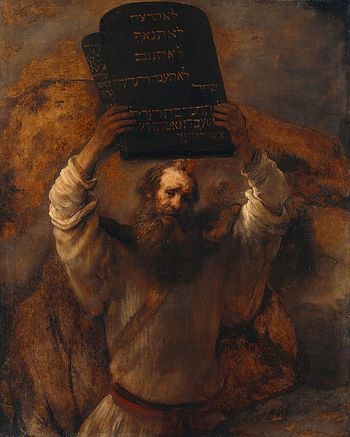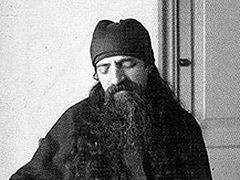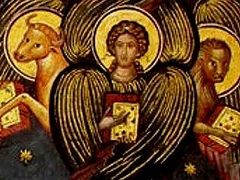That the promises and prophecies of God are accomplished through manifold trial and temptation, and that those who cleave to God alone are delivered from the temptation of the evil one.
1. The spiritual influence of God's grace within the soul works with great patience, wisdom, and mysterious management of the mind, while the man for long times and seasons contends in much endurance; and then the work of grace is proved to be perfect in him, his free will and choice being proved by much trial to be well-pleasing to the Spirit, and the man having displayed thoroughness and perseverance for a good length of time. We will illustrate this law of action from plain examples in the inspired scriptures.
2. What I mean is well exhibited in Joseph. What times and seasons it took to accomplish the predestined will of God concerning him, and to fulfil his visions. By what pains and afflictions and distresses he was first proved, and endured them all nobly, and was found in them all a thorough and faithful servant of God, and then became a king of Egypt, and nurtured his family, and the prophecy of things unseen was accomplished, and the will of God received its predicted end after long time and much management.
3. So with David. God anointed him king by the prophet Samuel, and when he was anointed, he fled from Saul, who pursued him to destroy him. Where then was God's anointing? Where was the promise, so far as the immediate future was concerned? After his anointing, he was grievously afflicted, wandering in desert places, and destitute even of bread, and taking refuge among the heathen because of Saul's designs against him. Such afflictions encompassed the man whom God had anointed to be king. Then after long trial, and affliction, and temptation, and patience, having once for all believed God, and assuring himself, "What God did for me by the prophet's anointing, and what God said should come to pass concerning me, must without doubt come to pass, even though long patience be required," at length the will of God was done, and David reigned after all his trials. Then the word of God was manifested, and the anointing at the hands of the prophet was shewn to be sure and true.
4. So with Moses. God having foreknown and predestined him to be the ruler and deliverer of the people, made him to become the son of Pharaoh's daughter, and he grew up to kingly fortune and splendor and luxury, being learned in all the wisdom of the Egyptians1; and when he reached man's estate, and was become great, he refused all those things, choosing rather the suffering affliction and the reproaches of the Christ, as the apostle says, than to enjoy the pleasures of sin for a season.2 He became a fugitive from Egypt; and how long did that son of a king, who was bred up to such enjoyment and royal luxury, spend in the labors of a shepherd! Then at length, being approved to God and found faithful through much patience, because he had endured many temptations, he became the deliverer, the ruler, the king of Israel, and was addressed by God as a God to Pharaoh.3 Through him God smote Egypt with plagues, and displayed through him great wonders upon Pharaoh, and finally drowned the Egyptians in the sea. See, after what length of time the will and purpose of God was declared, and after how many trials and afflictions it was fulfilled.
5. So again with Abraham. How long beforehand God promised to bestow on him a son, and yet gave him none there and then, but for how many intervening years trials and temptations befell him! But Abraham patiently endured all that came upon him, and was fully persuaded by faith that He who had promised, and could not lie, would fulfil His own word, and so being found faithful he obtained his promise.
6. In like manner Noah, being commanded in his five-hundredth year by God to prepare the ark, and warned that He would bring a flood upon the world, which was not brought until his six-hundredth year, waited patiently for a hundred years, nothing doubting whether God would do what He said or not, but being once for all fully persuaded by faith that what God had spoken must assuredly come to pass. So, being found approved by resolution and faith and endurance and much patience, he alone with his house was saved, having kept the commandment in purity.
7. We have alleged these scriptural grounds to show that God's grace in man, and the gift of the Holy Spirit, which is vouchsafed to a faithful soul, proceeds with much contention, with much endurance and longsuffering, and temptations and trials, the man's free will being tried by all manner of afflictions. And when it does not grieve the Spirit in anything, but is agreeable to grace through all commandments, then it is permitted to obtain freedom from passions, and receives the fulfilment of the Spirit's adoption, spoken of in a mystery, and of the spiritual riches, and of the intelligence which is not of this world, whereof true Christians are made partakers. For this reason they are for all purposes superior to all the men of prudence, intelligence, and wisdom, who have the spirit of the world.
8. For such an one judgeth all men,4 as it is written. He knows each man, from whence he speaks, and where he stands, and what measures he is in; but not a man of those that have the spirit of the world is able to know and judge him, but only he that has the like heavenly Spirit of the Godhead knows his like, as the apostle says: Comparing spiritual things with spiritual; but the natural man receiveth not the things of the Spirit, for they are foolishness unto him: but he that is spiritual judgeth all men, yet he himself is judged by none.5 Such an one looks upon all things that the world holds glorious, its riches, its luxury, and all its enjoyments – yea, and even its knowledge – and all things belonging to this age, as loathsome and hateful.
9. As one that is possessed and burning with a fever loathes and rejects the sweetest food or drink that you offer him, because he burns with the fever and is vehemently exercised by it, so those who burn with the heavenly, sacred, solemn longing of the Spirit, and are smitten in soul with love of the love of God, and are vehemently exercised by the divine and heavenly fire which the Lord came to send upon the earth, and desire that it should speedily be kindled,6 and are aflame with the heavenly longing for Christ, these, as we said before, consider all the glorious and precious things of this age contemptible and hateful by reason of the fire of the love of Christ, which holds them fast and inflames them and burns them with a God ward disposition and with the heavenly good things of love; from which love nothing of all that are in heaven and earth and under the earth shall be able to separate them, as the apostle Paul testified, saying, Who shall separate us from the love of Christ? and what follows.7
10. But it is not possible that any one should obtain the possession of his own soul, and of the heavenly love of the Spirit, unless he makes himself a stranger to all the things of this age, and gives himself up to seeking the love of Christ, and his mind stands clear of all material cares and earthly distractions, in order that he may wholly occupied with the one aim, directing these things by all the commandments, in order that his whole care and seeking, and the engrossment and business of his soul, may be about the search for the immaterial substance, how the soul should be adorned with the commandments of the virtues, and with the heavenly adornment of the Spirit, and with the fellowship of the purity and sanctification of Christ – so that having renounced all, and having cut himself free all round from the hindrances of earth and of material things, and set himself clear of fleshly love, whether it be the affection of parents or of kindred, the man may not permit his mind to be busied or distracted with any other thing, such as power, glory, honors, or fleshly friendships of the world, or any other earthly thoughts, but his mind may wholly and entirely take upon itself care and pains for the seeking of the immaterial substance of the soul, and may wholly and entirely endure in expectancy and waiting for the coming of the Spirit; as the Lord says, In your patience possess ye your souls,8 and again, Seek the kingdom and all these things shall be added unto you.9
11. So may it be, that one who thus strives, and at all times takes heed to himself, whether in prayer, or in obedience, or in any kind of work done according to God, should be able to escape the darkness of wicked devils. The mind that is never off the search of itself and the quest of the Lord avails to gain possession of its own soul—the soul that was in the perdition of the passions —by always bringing itself into captivity to the Lord with main force and earnestness, and by cleaving to Him only, as it is said, Bringing into captivity every thought to the obedience of Christ10; that by means of such striving and longing and seeking the mind may attain to become with the Lord one Spirit11of the gift and grace of Christ, resting in the vessel of the soul, which has prepared herself for every good work, and which does no despite unto the Spirit of the Lord12 by its own self will, and by the wanderings of this world, its glories, powers, self-determinations, or fleshly indulgences, and the companionships and society of evil men.
12. Lovely it is, when the soul, devoting herself wholly to the Lord, and cleaving to Him only, and dwelling mindfully in His commandments, and worthily honoring the Spirit of Christ which has come upon her and overshadowed her, is permitted to be one Spirit and one composition with Him, as the apostle says, He that is joined unto the Lord is one Spirit.13 But if a man gives himself away to cares, or glory, or power, or human honors, and seeks after these things, and his soul is mixed up and enters into composition with earthly considerations, or is bound and held by anything belonging to this age, and if such a soul longs to transfer itself and escape and get away from the darkness of passions, in which it is held by the evil powers, it cannot do so, because it loves and does the will of darkness, and does not perfectly hate the practices of wickedness.
13. Let us therefore prepare ourselves to travel to the Lord with an undivided will and purpose, and to become followers of Christ, to accomplish whatever He wills, and to think upon His commandments to do them.14 Let us sever ourselves altogether from the love of the world, and attach our souls to Him only, and keep in mind Him only as our business and care and quest. If we have to be somewhat busied also in body, with the business laid upon us, and with obedience for God's sake, let not the mind be parted from its love and quest and longing after the Lord; so that striving in such a mind, and journeying along the way of righteousness with an upright intention, and always taking heed to ourselves, we may obtain the promise of His Spirit, and may through grace be delivered from the perdition of the darkness of the passions, by which the soul is exercised, that we may be made meet for the eternal kingdom, and permitted to enjoy all eternity with Christ, glorifying the Father, the Son, and the Holy Spirit forever. Amen.







